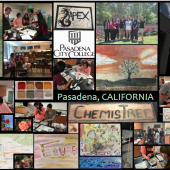Art-science intersections are a powerful means to inspire creative thinking in our future scientists, engineers, and citizens, which will allow them to imagine and build a sustainable world. Coupled to active learning and collaboration in science education, art can be a means to evoke deep meaning in abstract concepts such as Planetary Boundaries (PB). Relating PB to an individual’s choices and actions makes these concepts more tangible. As our nation strives to produce more science and engineering majors, we see an emphasis to recruit students to these fields early in their education, but this education does not always inspire creativity or encourage students to use their skills to create a sustainable future. This is particularly true in underrepresented, less privileged populations, where students see a career in science or technology as a means to live a more comfortable life—which can be very resource intensive on our planet. Through our undergraduate research program at Pasadena City College, we translate our research in sustainable materials into lessons to teach underrepresented middle school and high school students about sustainability. Hands-on classroom experiments focused on sustainability and renewable energy drive in-depth discussions relating PB to each student’s actions within their community. Outreach to underrepresented populations has stimulated interest in sustainability and careers in which STEM degrees can be applied to ‘green’ urban areas and make individuals aware of how their choices can impact the environment. Sustainability education is therefore an opportunity to promote diversity in the STEM workforce. Importantly, these outreach efforts have also greatly impacted the community college students who design and carry them out.
Continue Reading
As a background for these student responses, I would first like to describe the distinguished program they are a part of at Pasadena City College (PCC). The Early Career Undergraduate Research Experience (eCURe) is a program at PCC that provides students with an undergraduate research experience in the natural or physical sciences at the onset of their scientific careers. This unique experience inspires enthusiasm for scientific research by introducing students to research projects with broader impact in terms of sustainability, energy, the environment and emerging scientific technologies. In this particular eCURe research group led by Dr. Jillian L. Blatti, students have devised methods of synthesizing sustainable paints and testing their resultant properties; they have transposed their tested methods into lesson plans to engage local high schools in scientific outreach efforts, inspiring the next generation of scientists and science educators in sustainability education. As part of this outreach effort, students collaborated with Penn State University’s Nanotechnology Applications and Career Knowledge (NACK) Network in their Remotely Accessible Instruments for Nanotechnology (RAIN) program to bring hands-on experience with advanced analytical equipment to high school students via the Internet, including a scanning electron microscope and atomic force microscope, which they used to analyze sustainable paints they crafted in the classroom. In these highly interdisciplinary and collaborative projects, PCC students are learning to integrate concepts from their science courses into a research-based setting, generating novel questions, designing experiments, analyzing the results, and communicating their science to a broad audience. This innovative community college research program has inspired our students at PCC to continue scientific research in sustainability that they have become passionate about as they transfer to four-year institutions. What follows is accounts of chemical research in sustainability in the chemistry research laboratories at Pasadena City College, the eCURe students’ ‘sense of place’, and how it impacted their views on sustainability research and education.
Continue Reading